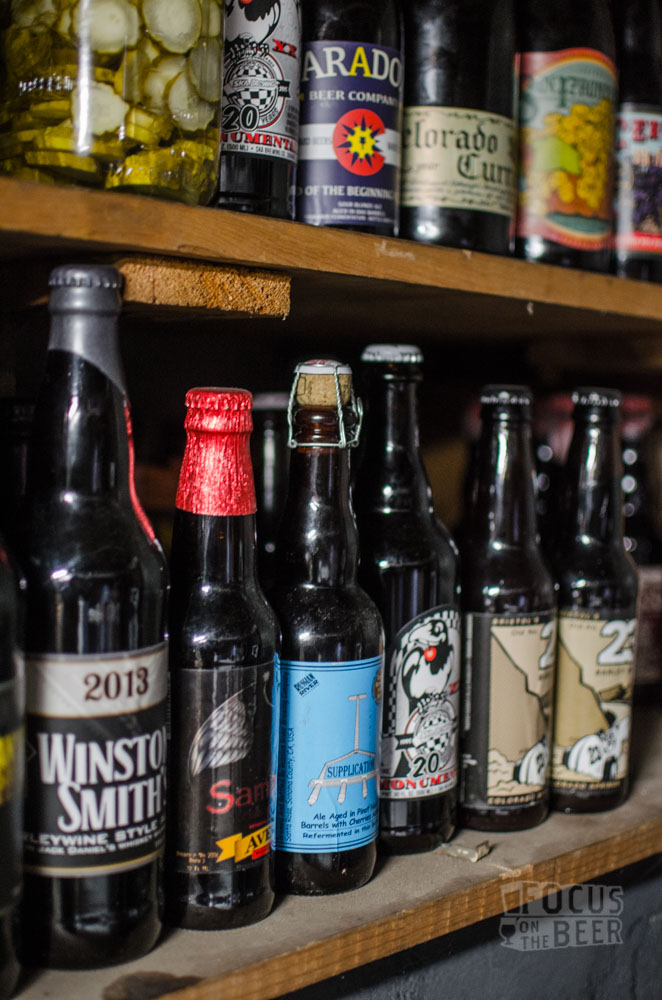Cellarmanship Part 3: What Beer Should I Age?
It's been awhile since our last Cellarmanship article, and it's not surprising that each of the last two posts have been among our most-read articles to date. While craft brewers strive to create the freshest possible product, craft beer consumers like to save things for later. If you're coming into this series right now, back up a few steps and see what the hubbub is all about.If you've been playing along, you've created a space to house your cellar, maybe the box in that dark corner of the basement, the extra fridge in your garage, or you may have convinced your significant other to allow you to install a slick beer fridge to show off your beers while you age them. Either way, you're ready to start putting away beer to save for a later date.Here's our three easy to remember rules for picking out beers to age:1. More Booze is Better. Shoot for beers above the 7% range as they'll hold up to extended aging the best. 2. Strong Flavors Rule. Beers with more pronounced flavors are more likely to retain that flavor over the long run. Anything smoked or barrel-aged is always a safe choice. You're also safe with anything sour or wild, as those will continue to mature in the bottles(if they're bottle conditioned) and you may get new and interesting flavors out of them. Beers with Brettanomyces will tend to "clean-up" the barnyard flavor over time.
2. Strong Flavors Rule. Beers with more pronounced flavors are more likely to retain that flavor over the long run. Anything smoked or barrel-aged is always a safe choice. You're also safe with anything sour or wild, as those will continue to mature in the bottles(if they're bottle conditioned) and you may get new and interesting flavors out of them. Beers with Brettanomyces will tend to "clean-up" the barnyard flavor over time. 3. Cheat The System. Don't play by the rules. Forget everything you've read. Remember, beer is a subjective medium. You may have a beer that you can't stand, so throw it in the cellar for a few months to a year and see how it turns out. Yes, craft brewers want you to drink beer as fresh as possible, but it doesn't hurt to lay a few down. Keep it in mind aging doesn't automatically make beer better.So, now that you've chosen a beer to put away, make sure you drink one fresh. Otherwise, you'll never know what flavors are changing or developing.Fast forward a few months/years—what's happening inside those bottles? There are many different ways the beer may have changed. You'll find that bitterness decreases over time, but harshness increases. Any bready or sweet flavors will increase, but so could the earthy or metallic flavors you didn't like in the fresh beer. Fruity, floral esters and flavors will definitely see a decrease, so don't plan on aging a can of Heady Topper and having it taste the same down the road. Does that mean you can't age IPAs? Styles like IPAs will lose much of the characteristics that make them taste good in the first place if you age them.We should be drinking IPAs as fresh as humanly possible—the hop resins and oils are breaking down as we speak! That said—aging a Double IPA, which has the increased hops, alcohol and malt, can actually help mellow out some of its intense flavors. The barrage of hops will disappear, but as the beer mellows, you'll be left with something very reminiscent of an American Barleywine.Just remember, in the end, aging beer is supposed to be fun. If you find that you aren't having fun, make sure you invite your friends over to help clean out your cellar or bar fridge.
3. Cheat The System. Don't play by the rules. Forget everything you've read. Remember, beer is a subjective medium. You may have a beer that you can't stand, so throw it in the cellar for a few months to a year and see how it turns out. Yes, craft brewers want you to drink beer as fresh as possible, but it doesn't hurt to lay a few down. Keep it in mind aging doesn't automatically make beer better.So, now that you've chosen a beer to put away, make sure you drink one fresh. Otherwise, you'll never know what flavors are changing or developing.Fast forward a few months/years—what's happening inside those bottles? There are many different ways the beer may have changed. You'll find that bitterness decreases over time, but harshness increases. Any bready or sweet flavors will increase, but so could the earthy or metallic flavors you didn't like in the fresh beer. Fruity, floral esters and flavors will definitely see a decrease, so don't plan on aging a can of Heady Topper and having it taste the same down the road. Does that mean you can't age IPAs? Styles like IPAs will lose much of the characteristics that make them taste good in the first place if you age them.We should be drinking IPAs as fresh as humanly possible—the hop resins and oils are breaking down as we speak! That said—aging a Double IPA, which has the increased hops, alcohol and malt, can actually help mellow out some of its intense flavors. The barrage of hops will disappear, but as the beer mellows, you'll be left with something very reminiscent of an American Barleywine.Just remember, in the end, aging beer is supposed to be fun. If you find that you aren't having fun, make sure you invite your friends over to help clean out your cellar or bar fridge.


